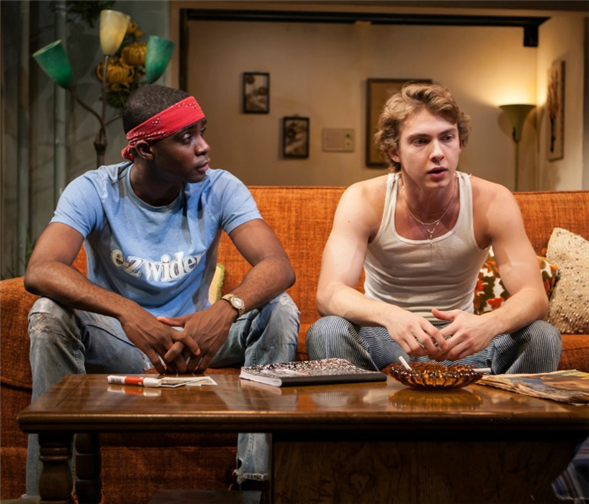Translate Page

Playwright Seth Zvi Rosenfeld revisits the NYC of his youth with Downtown Race Riot
---
Seth Zvi Rosenfeld's vividly remembers the 1976 rampage in Washington Square Park that inspired his new drama Downtown Race Riot, currently running at Off-Broadway's Pershing Square Signature Center. "I was 14 and had a lot of friends who went to school downtown," says the playwright who was raised on the Upper West Side. "There had been problems with some black guys in Washington Square Park selling bad drugs, so a bunch of people went to beat up anyone who was black or Spanish. I knew some of the kids who were peripherally involved. Years later I woke up one day thinking about it and about the idea of tribalism. To me, the play is about the cost of being part of a tribe."
Downtown Race Riot unfolds on a hot summer afternoon leading up to the planned attack, when a group of mostly white youths armed with bats and pipes left one man dead, another partially blind, and many others injured. The action focuses on Jimmy "P-nut" Shannon (David Levi), a poor white neighborhood teen trying to protect and please his drug-addicted single mom Mary (screen star Chloë Sevigny) and his Haitian best friend Marcel "Massive" Baptiste (Moise Morancy) as racially charged tensions mount.
New York City in the '70s was extremely segregated. According to Rosenfeld, "Certain people couldn't go to certain neighborhoods because you risked getting jumped." However, graffiti served as a kind of passport. "We explored the city through it," he says. "It was a way to be a street kid without doing other big crimes. It let you go in and out of different neighborhoods and hang out with multicultural groups."
Thanks to graffiti, Rosenfeld encountered "tough working-class white kids whose families had been in the Village for a long, long time," he says. "They felt like they were being invaded -- this was in the midst of the gay and civil rights movements. Their families were pretty conservative and Catholic. There was tension between them and the black and Puerto Rican and gay people that went to the Village because it was bohemian and the most free place in New York City."
Those conflicts bubble up and over in Downtown Race Riot, which is Rosenfeld's third production with the New Group after 2006's Everythings Turning Into Beautiful and 1997's The Flatted Fifth. "The play started writing itself," he recalls. "I think I wrote the first draft in three weeks. Later on, after we did some readings and workshops, it evolved into a real-time play that happens in an hour and a half. Let me tell you, that's hard to do!"
Rosenfeld says he brings his own struggles as an outsider to Downtown Race Riot, which explores the complicated themes of identity, community, and allegiance. "I was the only Jewish kid who hung out on my block," he says. "I was the protector of the Jewish kids and would make sure that no one would bother them on the way to shul. My mother is Sephardic and spoke some Spanish, so I would tell people I was half Puerto Rican. I never felt comfortable anywhere and I think that probably was good for writing, because I was always cataloging."
As for how Downtown Race Riot relates to today, Rosenfeld thinks it's obvious. "I don't have to spell it out because we are so polarized as a country," he says. "We have become super focused on our differences and until we start to talk with one another that will continue. So if there is an intent to this play -- and I didn't write it with one -- it's that these kids are all racist, but it's to humanize them, not to excuse them."
---
Eliza Bent is a playwright, performer, and sometime pundit. Follow her on Instagram at @getbentobox. Follow TDF on Instagram at @officialtdf.
Top image: Moise Morancy and David Levi in Downtown Race Riot. Photos by Monique Carboni.
TDF MEMBERS: Go here to browse our latest discounts for dance, theatre, and concerts.